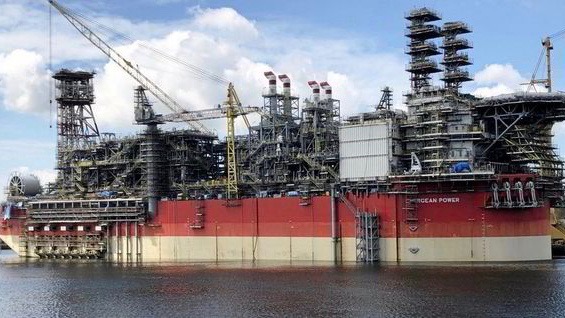The deputy secretary general of Lebanese resistance group Hezbollah, Sheikh Naim Qassem, claimed on Tuesday, July 5, that Israel should not be allowed to extract Lebanon’s natural resources from the Karish gas fields. Claiming that the “equation is clear,” Qassem said that Hezbollah will not sit and watch the loot of Lebanon’s resources. He said, “We demand our oil and our rights uncompromised,” al-Mayadeen reported.
Qassem was speaking during the ceremony commemorating Hezbollah’s 40th foundation day. Just days prior, Israeli forces claimed to have shot down three Hezbollah drones before they could hit the Karish gas field.
On Saturday, July 2, Hezbollah claimed that it had launched three drones towards the Karish field on a reconnaissance mission.
#BREAKING | The Islamic Resistance in #Lebanon, Hezbollah, announces the launch of 3 unarmed drones towards the disputed area at Karish gas field in southern Lebanon, in a reconnaissance mission. pic.twitter.com/Ty3A2I6BMP
— Al Mayadeen English (@MayadeenEnglish) July 2, 2022
One Hezbollah official claimed that Israel cannot extract gas from Karish “before we reach a deal to mark the boundaries in disputed areas.” He said that the objective behind sending the drones towards Karish was to “send a message to Israel” regarding Lebanon’s stance on the indirect talks with the Zionist regime. He said that the objective was “accomplished” before Israel shot down the drones. The unnamed Hezbollah source was quoted by the Iranian Press TV.
The Karish gas field is located around 80 kilometers west of the port city of Haifa in the Mediterranean Sea. Israel signed a USD 2 billion deal with European company Energean Power in May to extract gas from Karish, which is expected to come online by the end of this year.
Lebanon claims that the gas field falls within its own Exclusive Economic Zone, which extends till Line 29, and Israel has violated Lebanese sovereignty by claiming the Karish field as its own. Lebanon disputes the Israeli claims of sovereignty over the fields, which are exclusively based on a 2011 map prepared by US ambassador Frederic C Hof. The map demarcates Line 23 as the Lebanese line, giving the Karish field completely to Israel.
Since Lebanon does not have any diplomatic relations with Israel, it has been negotiating the border dispute indirectly under mediation by the US for years now.
Israeli aggression was also criticized by the Lebanese Communist Party and the Forces of Change, a new group made up of left and progressive forces that won 13 seats in the latest parliamentary elections in May this year. Forces of Change organized several protests against Israel and called for all Lebanese groups to unite to demand Line 29 as the line of Lebanese sovereignty.
Israel recently signed a gas deal with the European Union and the Karish field is expected to boost its overall gas production to fulfill its export commitments. Israel produces roughly 12 billion cubic meters of gas annually, most of which is used domestically. Israeli Defense Minister Benny Gantz and caretaker Prime Minister Yair Lapid have claimed on different occasions that Israel is prepared to go to any extent to defend its claims over Karish.
Extraction from Karish is a threat to peace in the region
After the arrival of the Energean Power ship to the Karish field last month, Lebanese Defense Minister Maurice Slim had claimed that Israeli activity in the disputed territory “constitutes a challenge and provocation to Lebanon and is a flagrant breach of stability” in the region. Prime Minister Najib Mikati and President Michel Aoun had also called for immediate international intervention to prevent Israel from again violating Lebanese sovereignty and international law.
#BREAKING | #Lebanese President Michel Aoun stressed #Lebanon's sovereignty over its waters and natural resources during #US diplomat Amos Hochstein's visit to #Beirut. pic.twitter.com/PJuJBpiR9t
— Al Mayadeen English (@MayadeenEnglish) June 14, 2022
Since its formation in 1948, Israel has invaded Lebanon several times. The UN constituted its Interim Force in Lebanon (UNIFIL) in 1978 and later extended its mandate to include, among other things, the monitoring of cessation of hostilities in the region following Israel’s 2006 attack in southern Lebanon.
Hezbollah was originally formed in 1982 as a resistance movement against the Israeli occupation of southern Lebanon. It was a leading force against the occupation, which lasted for almost two decades, and against repeated Israeli aggression, including the last invasion in 2006. Hezbollah has emerged as a leading political group in Lebanon.
Lebanon’s caretaker government criticized Hezbollah’s drones launch on Saturday as unacceptable, and is looking for a negotiated settlement with Israel. Hezbollah chief Hassan Nasrallah had said last month that the group’s main goal is to prevent “the enemy from extracting oil and gas from Karish and impending the activity that will start or that have already started.”





